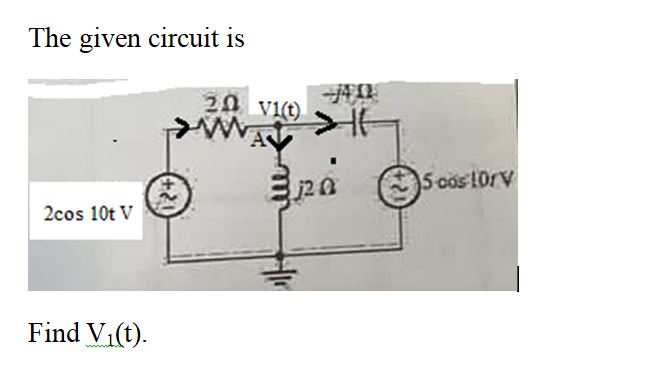Q4) By applying KCL to the node v/(t), the value of the voltage labeled v/(t) is (V): a) 2.86 cos(10t +77.9°) d) 4.1 cos(10t -62.3°) c) 4.1 cos(10t +62.3%) f) 3.92 cos(10t-77.9°) b) 2.86 cos(10t-77.9°) e) 3.92 cos(10t +77.9°)
Q4) By applying KCL to the node v/(t), the value of the voltage labeled v/(t) is (V): a) 2.86 cos(10t +77.9°) d) 4.1 cos(10t -62.3°) c) 4.1 cos(10t +62.3%) f) 3.92 cos(10t-77.9°) b) 2.86 cos(10t-77.9°) e) 3.92 cos(10t +77.9°)
Introductory Circuit Analysis (13th Edition)
13th Edition
ISBN:9780133923605
Author:Robert L. Boylestad
Publisher:Robert L. Boylestad
Chapter1: Introduction
Section: Chapter Questions
Problem 1P: Visit your local library (at school or home) and describe the extent to which it provides literature...
Related questions
Question
circuits, pleaseeeee solve questionnn4

Transcribed Image Text:The switch in Fig. 1 has been closed for long time. It opens at t=0. Please refer to the circuit of
Fig. 1 for the following questions (Q1, and Q2)
Q1) The time constant t can be found as:
a) 6.67 s b) 0.3 s
c) 10 s
d) 0.1 s
Q2) The current i(t) at t= 1m s is:
a) 2.02 A b) 6 A
c) 4.02 A
a) 1.23 cos(10t +30°) V
d) 2.25 cos(10t-53.6%) V
e) 0.15 s
d) 5.98 A e) 4 A
2cos101 V
b) 1.23 cos(10t-30°) V
e) 1.79 cos(10t -26.57°) V
20 400 40
www
HE
Refer to the circuit of Fig. 2 for the following 3 questions (Q3, Q4 and Q5)
Q3) By using superposition technique, the contribution of the 2cos10t voltage source to the value of
vi(t) is:
Q5) The value of the inductance of the j2 2 impedance is:
a) 0.2 H b) 10 H
c) 20 H d)1.6 H
e) 16 H
Q7) The current in(t) of Fig. 4 can be found as (mA):
a) 12.5cos(500t - 0.107°)
d) 12.5 cos(500t + 89.9°)
pa
Q6) Referring to the circuit of Fig. 3, Zin can be determined as:
a)22+j6Ω b)18+j6Ω c) 22-j6 Ω d) 18-j62 e)-18+j6 22
Q4) By applying KCL to the node v/(t), the value of the voltage labeled v/(t) is (V):
a) 2.86 cos(10t +77.9°)
b) 2.86 cos(10t-77.9°)
d) 4.1 cos(10t-62.3°)
c) 4.1 cos(10t +62.3°)
f) 3.92 cos(10t-77.9°)
e) 3.92 cos(10t +77.9°)
5923
5 cos 10rv
b) 12.5cos(500t+ 0.107°)
e) 12.5 cos(500t+ 0.205°)
20:2
-ww
c) 2.25 cos(10t +53.6°) V
f) 1.79 cos(10t+26.57°) V
10.0
ww
7 1.5 H
m
2 -15.02
-
1=0
Q9) The complex power absorbed by voltage source is (VA)
b)-751.3-j457. c)-823.5+j294.1
a) -823.5-j294.1
d) -751.3+j457.7
e) 751.3-j457.7
Fig. 1
102 cos5001 V
Fig. 2
Fig. 3
Refer to the circuit of Fig. 5 for the following 2 questions (Q8, and Q9)
Q8) The current through the-j10 2 can be found as (A rms)
a) 8.75/19.65*
b) 8.75-19.65*
c) 10.25/90*
d) 10.25Z-90°
e) 202-53.26
f) 20253.26
c) 12.5cos(500t - 89.9°)
f) 12.5 cos(500t - 0.205°)
10Ω (1) 6A
100/0° V ms
10042
www
0.2 i
Fig. 4
–ΠΟΥ
Fig. 5
11
2002
0.3mH
200
ww
1002
Expert Solution
Step 1
Solution 4.

Step by step
Solved in 2 steps with 2 images

Knowledge Booster
Learn more about
Need a deep-dive on the concept behind this application? Look no further. Learn more about this topic, electrical-engineering and related others by exploring similar questions and additional content below.Recommended textbooks for you

Introductory Circuit Analysis (13th Edition)
Electrical Engineering
ISBN:
9780133923605
Author:
Robert L. Boylestad
Publisher:
PEARSON

Delmar's Standard Textbook Of Electricity
Electrical Engineering
ISBN:
9781337900348
Author:
Stephen L. Herman
Publisher:
Cengage Learning

Programmable Logic Controllers
Electrical Engineering
ISBN:
9780073373843
Author:
Frank D. Petruzella
Publisher:
McGraw-Hill Education

Introductory Circuit Analysis (13th Edition)
Electrical Engineering
ISBN:
9780133923605
Author:
Robert L. Boylestad
Publisher:
PEARSON

Delmar's Standard Textbook Of Electricity
Electrical Engineering
ISBN:
9781337900348
Author:
Stephen L. Herman
Publisher:
Cengage Learning

Programmable Logic Controllers
Electrical Engineering
ISBN:
9780073373843
Author:
Frank D. Petruzella
Publisher:
McGraw-Hill Education

Fundamentals of Electric Circuits
Electrical Engineering
ISBN:
9780078028229
Author:
Charles K Alexander, Matthew Sadiku
Publisher:
McGraw-Hill Education

Electric Circuits. (11th Edition)
Electrical Engineering
ISBN:
9780134746968
Author:
James W. Nilsson, Susan Riedel
Publisher:
PEARSON

Engineering Electromagnetics
Electrical Engineering
ISBN:
9780078028151
Author:
Hayt, William H. (william Hart), Jr, BUCK, John A.
Publisher:
Mcgraw-hill Education,